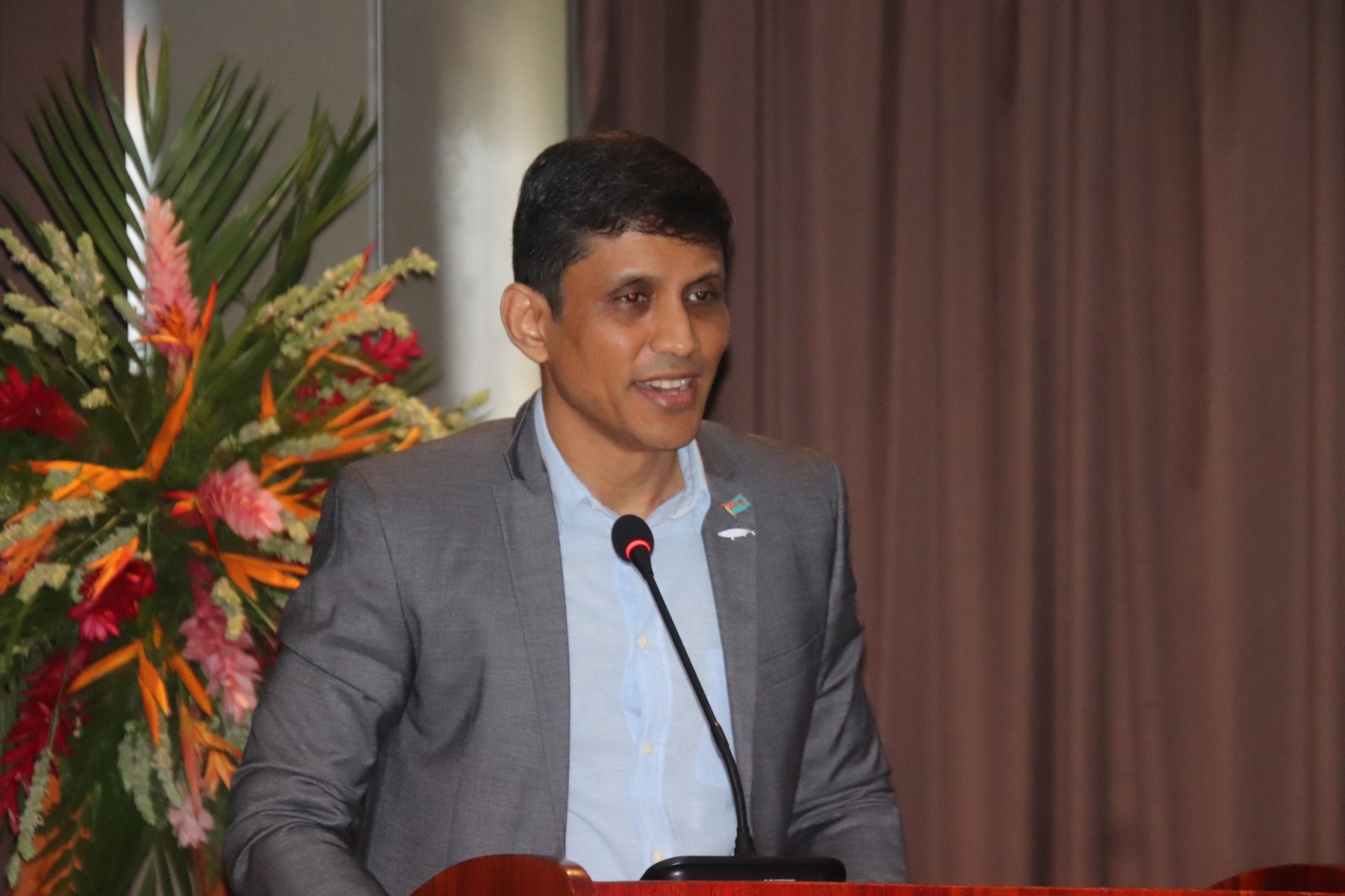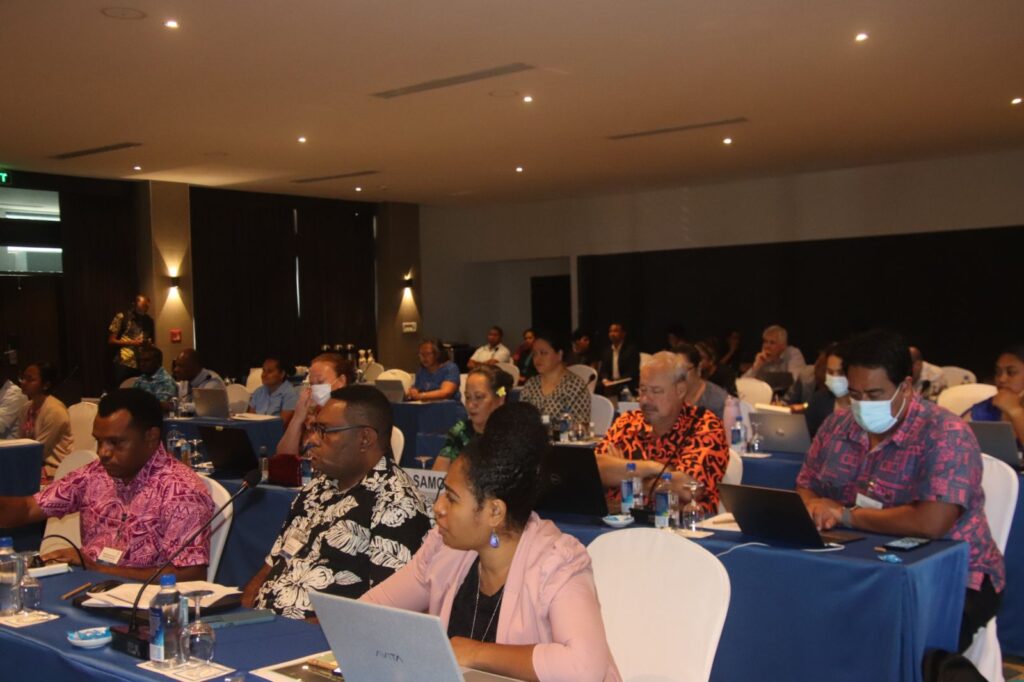Ambassador Luke Daunivalu, Permanent Representative to UN and other Organisations,
Pacific Ambassadors from Geneva, Amb Nella, Amb Sumbae
Ambassador Mere Falemaka, Pacific Island Forum Permanent Representative to the WTO,
Clarisse Morgan, Director, Rules Division, WTO,
Forum Fisheries Association,
Senior Pacific Trade and Fisheries Officials,
WELCOME
Bula Vinaka and welcome to Fiji.
It is always a pleasure hosting you, our colleagues, in Fiji. It has been a while since we have met as Pacific Trade and Fisheries Officials. And it has also been a while since we have welcomed the World Trade Organization (WTO) Secretariat to Fiji and the Pacific. The last time was in 2019.
A lot has happened since then. We had a pandemic. We have several natural disasters. We had the 12th Ministerial Conference (MC12). And now we have an Agreement on Fisheries Subsidies Agreement.
IMPORTANCE OF FISHERIES TO THE PACIFIC
Ladies and gentlemen, Colleagues,
This two-day workshop is critically important for the Region and is very timely. It will help us familiarise ourselves with the Agreement on Fisheries Subsidies text.
But we must keep in mind, this is not merely an agreement for us. Fisheries is one of the largest economic sectors in our Region. It is intertwined with our culture, our day to day living, our livelihood and survival.
Thus, any multilateral agreement on fisheries should have the interest of the Pacific at the front and centre, not as an afterthought.
FISHERIES SUBSIDIES AGREEMENT
This is why Fiji and the Pacific raised its voice and was heard at the MC12. We have had a major hand in shaping the Agreement that is before us.
So we need to be clear what needs to be done going forward — which this workshop will assist in.
Colleagues,
You will all agree, the Fisheries Subsidies Agreement, agreed to at the WTO MC12, as part of the Ministerial outcomes, and was a historic achievement, after 21 years all talk and no agreement. It was an Agreement that the Pacific had a major influence in delivering. That’s something to be proud of.
The “Partial Agreement”, as it is known, is certainly not perfect. But relative to where the negotiations were heading, and the draft text that was circulated at the eve of the conclusion of the Ministerial Conference, as a Region, we are in a much better position with the Agreement that was finally agreed.
The alternatives were either — no deal in Fisheries, and detrimental subsidies around the world continue as normal — or accepting a compromised version of the Agreement, with special and differential treatment (S&DT) and rights over our own resources permanently locked out. The current Agreement, therefore, provides a platform to safeguard and manage our resources.
Colleagues,
We have come a long way. And it was not an easy journey in getting an Agreement on Fisheries Subsidies. We were there throughout the process. We know, it took us near-two decades to get a Partial Agreement. We also have within the Agreement a water-tight mandate to negotiate a Comprehensive Agreement — or else the whole Agreement terminates.
PACIFIC’S LEADERSHIP
For the first time in the history of WTO and the Ministerial Conferences, the Pacific was called to the “green room” discussions. After almost 12 hours of non-stop negotiations, we managed to bring back into the agreement a number of provisions that gave purpose to the agreement.
One of the key takeaways from this experience was that through determination and solidarity, the Pacific Group can make our voices heard and shape outcomes in the multilateral trading system. So even as Small Island Developing States (SIDS), we have the ability to safeguard the welfare of our peoples and the welfare of the resources our livelihoods depend on.
THE “PARTIAL” FISHERIES SUBSIDIES AGREEMENT
Colleagues,
The “Partial Agreement” contains three major disciplines:
I. prohibits subsidies for fishing vessels or operators that engage in Illegal,
Unreported and Unregulated (IUU) fishing;
II. prohibits subsidies that go toward fishing of overfished stocks; and
III. prohibits subsidies for fishing and fishing-related activities on the high seas that are outside the competence of a regional fisheries management organisation.
As you are aware, the negotiations and the work does not end here. We need clarity in our conviction.
We need to remove all doubts that we may have so that there is a clear pathway towards a Comprehensive Agreement (what’s being termed as, the second wave of negotiations).
We also must maintain momentum to ensure that the Pacific ratifies the “Partial Agreement”, whilst pushing for negotiations on a Comprehensive Agreement (a two-track approach).
The Comprehensive Agreement needs to have certain essential elements from the
Pacific’s point of view. This includes:
● Strengthened disciplines on overfishing and overcapacity;
● Reinforced rights and sovereignty over our waters, as provided under UNCLOS
● Special and Differential Treatment for developing countries, especially SIDS ● Disciplines on Distant Water Fishing Nations when fishing in the Pacific.
WAY FORWARD
Colleagues,
The Pacific’s vision has always been to have an agreement that will help us grow our fisheries sector, sustainably.
This means we need the support of not just the six Pacific members, but Australia, New Zealand, and the entire ACP Grouping.
Simply said, we need 109 members to ratify this Agreement, as early as possible. At the same time negotiations on the Comprehensive package need to commence immediately.
We cannot afford to let the talks drag on for another 21 years, at the behest of a few members of the WTO. Because by doing so, we are doing a disservice to our Pacific people — people who depend on us to ensure that their rights and their resources are protected.
Colleagues,
Five months have passed since the Ministerial Conference. The task ahead is not simple, and should not be underestimated.
Thus, as part of the outcomes of this workshop, we need to arrive at clear negotiating positions. This will provide clear guidance to our Ministers who will be meeting in two days’ time
To continue making an impact on these negotiations, requires a united Pacific front.
Let’s keep the passion and vigour with which we have been negotiating the Fisheries Subsidies Agreement thus far alive. We have to leave behind a legacy that our future generations will be proud of, and can benefit from.
With these words, I wish you well in the discussions over the two-days.
Vinaka vakalevu.




